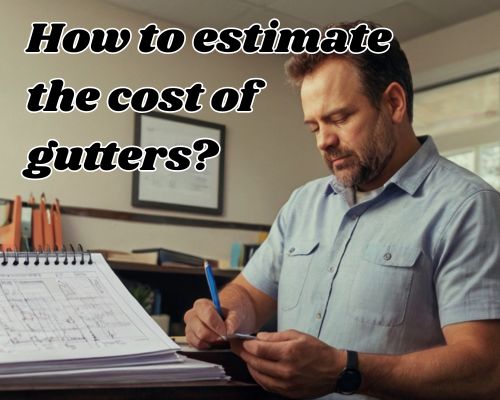How to Estimate the Cost of Gutters in West Palm Beach, Florida: A Comprehensive Guide for Homeowners
How to Estimate the Cost of Gutters in West Palm Beach, Florida: A Comprehensive Guide for Homeowners
When it comes to home maintenance in West Palm Beach, Florida, one often overlooked—yet crucial—component is your gutter system. Gutters not only protect your home’s foundation from water damage but also contribute to its overall curb appeal. But before you jump into a replacement or installation project, it’s essential to understand how to estimate the cost of gutters. With Gutters Of West Palm Beach, we’ll break down everything you need to know: from material choices to local labor costs, gutter styles, and installation factors—so you can plan your budget wisely.

Why Accurate Gutter Cost Estimation Matters
West Palm Beach’s subtropical climate is no stranger to heavy rainfall and tropical storms. A reliable gutter system is your first line of defense against roof runoff, foundation erosion, and mold buildup. But pricing can vary widely depending on several factors, and misestimating can lead to overpaying or underpreparing.
Knowing how to estimate the cost of gutters empowers homeowners to make cost-effective, long-term decisions—especially in areas like Palm Beach County, where seasonal weather patterns demand durability and quality.
Key Factors That Influence Gutter Costs
1. Gutter Material
Material choice has the most significant impact on pricing. Here’s a quick breakdown of the most popular options in West Palm Beach:
- Vinyl Gutters: Starting around $3–$5 per linear foot installed. Lightweight and corrosion-resistant but not ideal for high-heat environments.
- Aluminum Gutters: Roughly $5–$10 per linear foot. Affordable, rust-proof, and well-suited for Florida’s humid climate.
- Galvanized Steel Gutters: $8–$12 per foot. Durable but prone to rust over time if not properly coated.
- Copper Gutters: $20–$40 per foot. Aesthetic and durable but a luxury option mostly seen in upscale West Palm Beach neighborhoods.
- Zinc Gutters: $15–$30 per foot. Long lifespan and high-end look but requires professional installation.
Pro tip: In areas like West Palm Beach, aluminum gutters are the most popular due to their blend of affordability and resistance to salt air corrosion.
2. Gutter Style and Shape
The design of the gutter also affects pricing:
- K-style gutters: Most common, cost-effective, and hold more water.
- Half-round gutters: Often seen on historic or Mediterranean-style homes in West Palm Beach. They tend to be pricier and require more brackets for installation.
- Box gutters: Typically used in commercial buildings but gaining popularity in modern home designs.
K-style gutters are the standard in Florida, especially for residential properties in zip codes like 33401 and 33405.
3. Home Size and Roofline Complexity
To estimate costs accurately, calculate the linear footage of gutters required. A typical single-story, 2,000 sq ft home might need around 150–200 feet of gutters. Multiply this by your chosen material’s cost per foot to get a baseline.
Complex rooflines, multiple gables, or multistory homes in neighborhoods like El Cid or Flamingo Park may increase installation labor and accessory requirements (like downspouts, hangers, and end caps).
4. Labor and Local Contractor Rates
In West Palm Beach, FL, labor costs typically range from $2–$4 per linear foot, depending on the contractor’s expertise and the difficulty of the job.
For example:
- Basic installation (single story): ~$7–$10 per linear foot total.
- More complex jobs (e.g., multi-story or angled roofs): Upwards of $12–$20 per foot.
Always get multiple quotes from licensed and insured gutter installers like Gutters Of West Palm Beach. Look for those with strong reviews and local experience dealing with Florida’s storm season.
5. Accessories and Add-Ons
Want to reduce gutter maintenance in the long run? Consider these:
- Gutter Guards: Prevent clogging from palm fronds and debris. ~$3–$7 per foot installed.
- Downspouts: Vital for directing water away from your home. Usually $5–$10 per linear foot.
- Splash Blocks & Drainage Extensions: Help protect your landscaping and foundation. Expect $10–$30 each depending on type.
For coastal homes in areas like Riviera Beach or Lake Worth, leaf guards are especially important due to wind-blown debris from native vegetation.
How to Estimate Gutter Cost: A Simple Formula
Let’s break it down into a sample formula you can use at home:
Total Gutter Cost = (Linear Feet x Material Cost) + (Linear Feet x Labor Cost) + Add-ons
Example Estimate:
- Home size: 150 linear feet
- Material: Aluminum ($7/ft incl. install)
- Gutter guards: $5/ft
- Total cost = (150 x $7) + (150 x $5) = $1,050 + $750 = $1,800
This estimate can go higher depending on the brand, complexity, and optional features like color-matched gutter paint or storm-resistant fasteners.
West Palm Beach Considerations
Here’s where local knowledge pays off. Specific to West Palm Beach, homeowners should factor in:
- Salt Air Exposure: Especially east of I-95, which can corrode metal gutters faster.
- Hurricane Readiness: Installers must follow Florida Building Code, including wind resistance requirements.
- HOA Guidelines: Certain neighborhoods (e.g., Southend or Northwood) may have aesthetic rules about exterior finishes.
Always check with the City of West Palm Beach’s Building Division before beginning work. Permits may be required for full-system replacements.
Tips for Saving Money Without Sacrificing Quality
- Bundle services: Many roofers in West Palm Beach also install gutters. Combine services for better pricing.
- Ask about warranties: A reputable installer will offer warranties on both product and labor—typically 20+ years for aluminum.
- Seasonal deals: Off-season months (like January–March) may have lower installation rates.
- Use seamless gutters: Fewer joints = fewer leaks and less maintenance. Seamless aluminum gutters are a top choice in coastal Florida.
Final Thoughts: Making Smart Gutter Decisions in Palm Beach County
Now that you know how to estimate the cost of gutters, you can approach your next home improvement project with confidence. Whether you’re upgrading gutters on a vintage Spanish-style bungalow in Flamingo Park or a modern build in downtown West Palm Beach, your estimate should consider material, labor, accessories, and local climate factors.
Investing in the right gutter system now can save thousands in water damage repairs later. Don’t just go with the cheapest option—opt for the solution that fits your home, your climate, and your future plans.


















